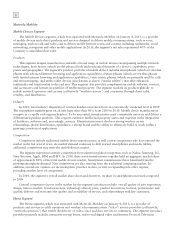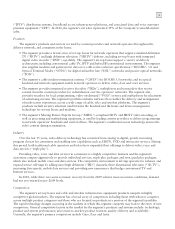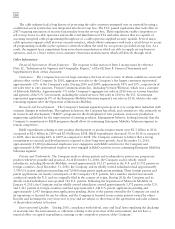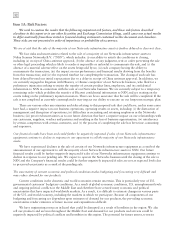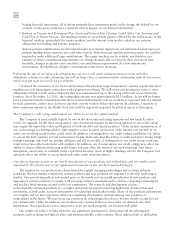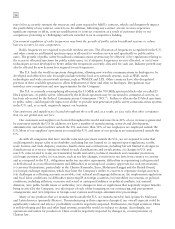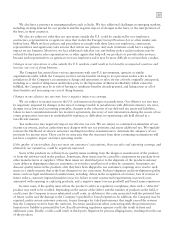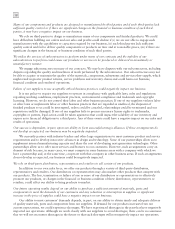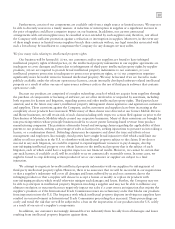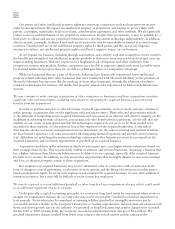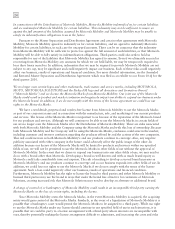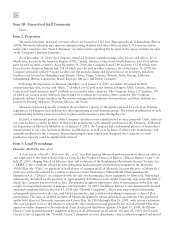Motorola 2010 Annual Report Download - page 25
Download and view the complete annual report
Please find page 25 of the 2010 Motorola annual report below. You can navigate through the pages in the report by either clicking on the pages listed below, or by using the keyword search tool below to find specific information within the annual report.
17
We also have a presence in emerging markets such as India. We face additional challenges in emerging markets,
including creating demand for our products and the negative impact of changes in the laws, or the interpretation of
the laws, in those countries.
We also are subject to risks that our operations outside the U.S. could be conducted by our employees,
contractors, representatives or agents in ways that violate the Foreign Corrupt Practices Act or other similar anti-
bribery laws. While we have policies and procedures to comply with these laws, our employees, contractors,
representatives and agents may take actions that violate our policies. Any such violations could have a negative
impact on our business. Moreover, we face additional risks that our anti-bribery policy and procedures may be
violated by third party sales representatives or other agents that help sell our products or provide other services,
because such representatives or agents are not our employees and it may be more difficult to oversee their conduct.
Changes in our operations or sales outside the U.S. markets could result in lost benefits in impacted countries and
increase our cost of doing business.
The Company has entered into various agreements with non-U.S. governments, agencies or similar
organizations under which the Company receives certain benefits relating to its operations and/or sales in the
jurisdiction. If the Company’s circumstances change and operations or sales are not at levels originally anticipated,
including as a result of obligations undertaken prior to the Separation of Motorola Mobility which cannot be
fulfilled, the Company may be at risk of having to reimburse benefits already granted, and losing some or all of
these benefits and increasing our cost of doing business.
Changes in our effective tax rate may have a negative impact on earnings.
We are subject to income taxes in the U.S. and numerous foreign tax jurisdictions. Our effective tax rate may
be negatively impacted by changes in the mix of earnings taxable in jurisdictions with different statutory tax rates,
changes in tax laws and accounting principles, changes in the valuation of our deferred tax assets and liabilities,
failure to meet commitments under tax incentive agreements, discovery of new information during the course of tax
return preparation, increases in nondeductible expenses, or difficulties in repatriating cash held abroad in a
tax-efficient manner.
Tax audits may also negatively impact our effective tax rate. We are subject to continued examination of our
income tax returns, and tax authorities may disagree with our tax positions and assess additional tax. We regularly
evaluate the likelihood of adverse outcomes resulting from these examinations to determine the adequacy of our
provision for income taxes. There can be no assurance that the outcomes from these continuing examinations will
not have a negative impact on future operating results.
If the quality of our products does not meet our customers’ expectations, then our sales and operating earnings, and
ultimately our reputation, could be negatively impacted.
Some of the products we sell may have quality issues resulting from the design or manufacture of the product,
or from the software used in the product. Sometimes, these issues may be caused by components we purchase from
other manufacturers or suppliers. Often these issues are identified prior to the shipment of the products and may
cause delays in shipping products to customers, or even the cancellation of orders by customers. Sometimes, we
discover quality issues in the products after they have been shipped to our customers, requiring us to resolve such
issues in a timely manner that is the least disruptive to our customers. Such pre-shipment and post-shipment quality
issues can have legal and financial ramifications, including: delays in the recognition of revenue, loss of revenue or
future orders, customer-imposed penalties on us for failure to meet contractual requirements, increased costs
associated with repairing or replacing products, and a negative impact on our goodwill and brand name reputation.
In some cases, if the quality issue affects the product’s safety or regulatory compliance, then such a “defective”
product may need to be recalled. Depending on the nature of the defect and the number of products in the field, it
could cause the Company to incur substantial recall costs, in addition to the costs associated with the potential loss
of future orders and the damage to the Company’s goodwill or brand reputation. In addition, the Company may be
required, under certain customer contracts, to pay damages for failed performance that might exceed the revenue
that the Company receives from the contracts. In certain jurisdictions when contracting with the government no
limitation to liability is permitted by law. Recalls involving regulatory agencies could also result in fines and
additional costs. Finally, recalls could result in third-party litigation by persons alleging harm, resulting from the use
of the products.



